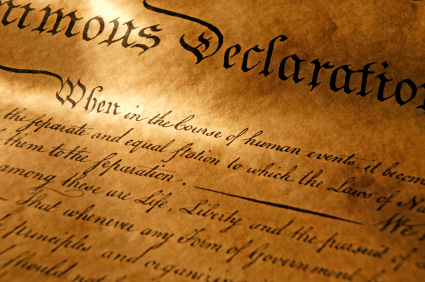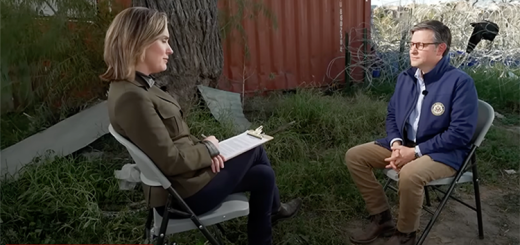Our problems are ours to solve.
It was Albert Einstein that said, “When the solution is simple, God is answering.”
It was Warren Buffet who said, “The business schools reward difficult complex behavior more than simple behavior, but simple behavior is more effective.”
I offer these two quotes on simplicity to make a point.
Our country’s founding principles and its founding documents are elegant in their straightforward simplicity. The founders believed that if individual liberty could be allowed to flourish, a great nation could rise.
America went on from its founding to become very rich. And it did so by solving human problems that had plagued mankind for the previous 50,000 years.
In the course of American history, we have wiped out starvation as a killer. Yes, there are people in America today who are hungry. Yes, some people struggle to come up with enough money to pay for food. But starve to death in America? It is almost literally true that it cannot be done.
What about poverty? America wiped out poverty as it was previously defined. In America, today’s poverty bears little resemblance to the crushing poverty that defined much of Europe in the 17th and 18th centuries. In America today, it is possible to own a car, a television, have cable TV and live in a free-standing home with heat and air conditioning and still be defined as living in poverty. Our poverty rate thus defined stands today at roughly 12 percent. In most of Europe at the time of America’s founding, the poverty rate approached 80 percent.
America has been successful, I believe, because it remained true to three very simple principles.
The first principle is embrace education. My mother went to school in a small school house in Delta County, Texas and never attended college. Yet she was more broadly educated and had a better command of English, math and history than many of the college graduates that I see today. She pursued education all of her life. She read. She thought. She discerned and she was thus able to succeed in a competitive economy. She also, by gosh, insisted that I do my homework.
If you have a child, accept the idea that he or she will follow your example on education. That means, put simply, your child’s homework is your homework. Until fairly late in the typical kid’s academic career, homework won’t happen unless parents make it happen. When the homework doesn’t get done, the school work suffers. When the school work suffers enough, the kid becomes discouraged and drops out at the first opportunity. From there, almost all hope is lost.
The second principle is work hard. There simply is no substitute for applied effort. The miracles of the free market are largely out of reach of those who choose not to apply themselves. Capitalism is particularly unforgiving of idleness.
But implicit in the concept of working hard is being permitted to keep the fruits of one’s labor. Onerous taxation removes the incentive to take the extra step, to put forth incremental effort in the hope of incremental reward. Tax hard work and you’ll get less of it. Pure and simple.
The third principle that made America great is tell the truth. In every transaction at every level, be it business or social, there is an implied covenant of good faith and fair dealing. Break that covenant, and the wheels start coming off. We all talk about lying politicians. And there is ample evidence that politicians as a class of human being are devolving rather than evolving.
But don’t underestimate the damage done to the republic by the Bernie Madoffs and the Ken Lays of the world. If we are to prosper as a nation, we must be a nation of people who tell the truth and deal with one another fairly. An executive at Southwest Airlines once said that the fewest number of no-show reservations come from those made in Texas. “If a Texan says he’ll be there, he’ll be there,” this executive said. That’s a good reputation to have and it’s one that should be the overarching narrative on Americans. And it is elegantly simple.
Our Congress is busy drafting mind-numbingly complex legislation in a vain attempt to make our country better. They have no hope of doing so. Our republic wasn’t founded on the idea that government would solve the problems that we face.
Our republic was founded on the idea that if given the freedom, we could solve the problems that we face.
I still believe that.









Mr. Gleiser,
I very much enjoy your segments. You seem much smarter than the average bear, therefore.
Can you please explain this. The other day as I drove around the south loop, I couldn’t help but notice the new street lights. When every governmental agency is bleeding red ink out of every orafice, why in the world are we wasting money on this. There are hundreds of lights adorning the loop from Broadway to Spur 346. This kind of garbage is hard to swallow, particularly when they keep raising taxes at every opportunity. Is this nonsense going the entire 25 miles of the loop?
Sincerely,
Larry Walker
Troup, Texas
Paul, I wasn’t sure which topic heading was the best to place this with, so please forgive me if it is out of order a bit.
The recent generous outpouring of love, kindness, and charity within the East Texas community toward the Carr family in Mineola, and the new home being constructed by the Extreme Home Makeover TV program has touched my heart with mixed emotions. I am pleased to see such a deserving family receive a beautiful and needed improvement to their dwelling problems. I am a firm believer our society has, in general, a good heart when it comes to those in real need. God will bless them for their charitible deeds.
With that being said, here’s my concern. What happens when the TV bus leaves, the cameras stop, and the Ty Pennington crew go back home? What about:
1) Income Taxes on the gift. Who pays that?
2) The probable increase in property taxes?
3) The increase in utility bills on the large and wonderful new structure?
4) The increase in insurance cost?
5) Is there an existing mortgage from the old dwelling?
6) Is the new home “tax free” with no strings attached? If not, does the community have a plan for continued aid to help the family with these matters, or will the Carr family fall victim to the tax man? I pray not.
7) How will they handle the upkeep?
Do you remember the winner of the HGTV Dream home at Lake Tyler? He could not pay his taxes and ultimately lost the home. I suspect he regrets ever registering to win.
I would like to see someone either do an investigative report or knowlegeably comment on this matter, as I would really like to know the answer to these questions, I think. In today’s world we must be very careful that our charity is not too costly to those receiving it.
Mike Burleson
Troup, Texas